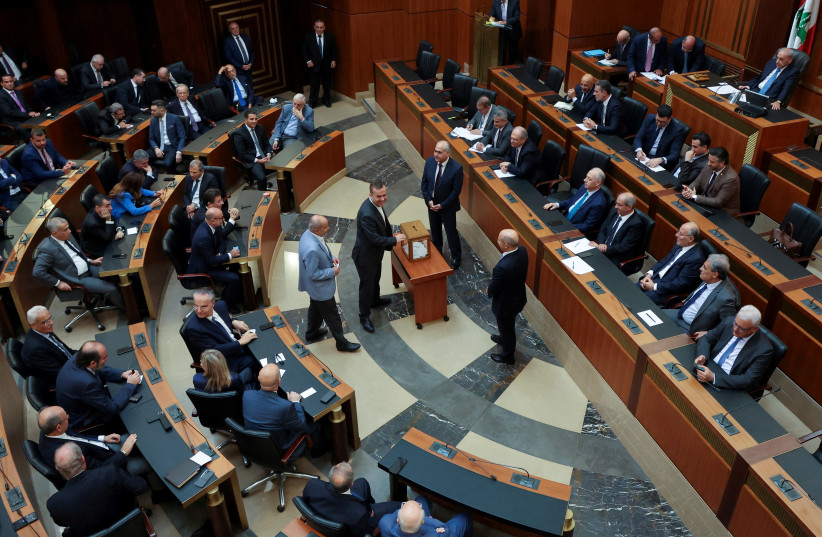Lebanese parliament fails to elect president in 12th attempt
Lebanon’s parliament failed to elect a president in its 12th attempt to do so on Wednesday morning, over half a year since former president Michel Aoun left office in October, leaving the position vacant and exacerbating Lebanon’s already severe political and economic crisis.
The election of a new president in Lebanon requires the presence of a two-thirds quorum (85 MPs). Both blocs in the parliament said ahead of the vote that they would disrupt the quorum if they felt the other bloc’s candidate would win, as they’ve done in most of the previous attempts. The quorum was lost right after the vote as MPs left the hall.
Any presidential candidate would need 86 votes in the first round of voting or 65 in the second round in order to be elected. Former finance minister Jihad Azour – the candidate backed by the Christian parties and the parties opposing Hezbollah – received 59 votes, while former health minister Suleiman Frangieh – the candidate backed by Hezbollah and the Amal movement – received 51 votes. 17 other votes were placed for other candidates.
 Hezbollah member of the parliament Hassan Fadlallah casts his vote during the first session to elect a new president at the parliament building in Beirut, Lebanon September 29, 2022 (credit: MOHAMED AZAKIR/REUTERS)
Hezbollah member of the parliament Hassan Fadlallah casts his vote during the first session to elect a new president at the parliament building in Beirut, Lebanon September 29, 2022 (credit: MOHAMED AZAKIR/REUTERS)Who are the main candidates in the running?
Azour and Frangieh are currently the central candidates in the race, with the country’s largest Christian parties – the Free Patriotic Movement, the Lebanese Forces, and Kataeb Party – backing Azour.
Azour currently serves as the International Monetary Fund’s Director of the Middle East and Central Asia.
Frangieh serves as the head of the Hezbollah-allied Marada Movement and served in the past as an MP and as health minister.
The Free Patriotic Movement shifted to support Azour ahead of the vote on Wednesday. The movement used to have strong ties with Hezbollah, but the relationship between the two movements fractured in recent years amid political disagreements.
On Tuesday, the head of the Free Patriotic Movement, Gebran Bassil, referred to the split stating “We still agree on resistance and on the principle of the defensive strategy, so the understanding [with Hezbollah] did not fall apart, but it is not in good shape, so we described it as standing on one foot.”
Bassil added that he was hoping to convince Hezbollah to drop its insistence on supporting only Frangieh and warned Hezbollah and the Amal movement against trying to convince members of his party to vote against Azour.
The Free Patriotic Movement head warned Hezbollah and the Amal movement against trying to convince members of his party to vote against Azour and warned his party members that they would face internal action if they voted against party lines. He additionally stressed that “no one can bypass the Christian component in a critical milestone such as the presidency.”
Bassil stressed that while his party had agreed to join the other parties supporting Azour, it was not forming an alliance with them and still disagreed with their positions against Hezbollah.
In 2014, Lebanon also failed to elect a president after the previous president’s term ended, leaving a vacuum that lasted two years and forty-six rounds of votes, until Michel Aoun was elected as president in October 2016. In the interim, the government of then-prime minister Tamaam Salam assumed presidential duties.





Comments are closed.